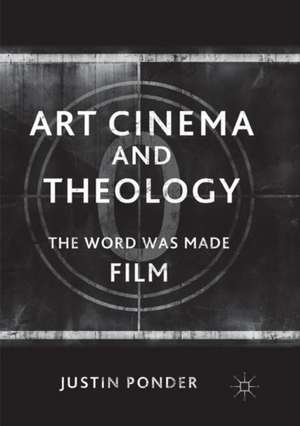Art Cinema and Theology: The Word Was Made Film
Autor Justin Ponderen Limba Engleză Paperback – 23 aug 2018
| Toate formatele și edițiile | Preț | Express |
|---|---|---|
| Paperback (1) | 409.57 lei 38-44 zile | |
| Springer International Publishing – 23 aug 2018 | 409.57 lei 38-44 zile | |
| Hardback (1) | 644.18 lei 6-8 săpt. | |
| Springer International Publishing – 27 oct 2017 | 644.18 lei 6-8 săpt. |
Preț: 409.57 lei
Preț vechi: 445.19 lei
-8% Nou
Puncte Express: 614
Preț estimativ în valută:
78.37€ • 82.03$ • 65.23£
78.37€ • 82.03$ • 65.23£
Carte tipărită la comandă
Livrare economică 27 martie-02 aprilie
Preluare comenzi: 021 569.72.76
Specificații
ISBN-13: 9783319864280
ISBN-10: 3319864289
Pagini: 214
Ilustrații: XII, 214 p. 15 illus., 3 illus. in color.
Dimensiuni: 148 x 210 mm
Ediția:Softcover reprint of the original 1st ed. 2017
Editura: Springer International Publishing
Colecția Palgrave Macmillan
Locul publicării:Cham, Switzerland
ISBN-10: 3319864289
Pagini: 214
Ilustrații: XII, 214 p. 15 illus., 3 illus. in color.
Dimensiuni: 148 x 210 mm
Ediția:Softcover reprint of the original 1st ed. 2017
Editura: Springer International Publishing
Colecția Palgrave Macmillan
Locul publicării:Cham, Switzerland
Cuprins
1. Introduction: The Word Was Made Film.- 2. “All is Grace”: Sound and Grace in Robert Bresson’s Diary of a Country Priest.- 3. “Life. Yes. Life.”: Editing and Miracles in Carl Theodor Dreyer’s Ordet.- 4. “The Whole Earth is Full of His Glory”: Lighting and Suffering in Ingmar Bergman’s Winter Light.- 5. “No One Must Know of This”: Close-up and Heresy in Luis Buñuel’s The Milky Way.- 6. Conclusion: “…And Dwelt Among Us”.
Notă biografică
Justin Ponder is Associate Professor of English at Marian University, USA. He has written on theology and film in the Journal of Religion and Film, Religion and the Arts, and Imaginatio et Ratio.
Textul de pe ultima copertă
This book examines postmodern theology and how it relates to the cinematic style of Robert Bresson, Carl Theodor Dreyer, Ingmar Bergman, and Luis Buñuel. Ponder demonstrates how these filmmakers forefront religious issues in their use of mise en scène. He investigates both the technical qualities of film “flesh” and its theological features. The chapters show how art cinema uses sound, editing, lighting, and close-ups in ways that critique doctrine’s authoritarianism, as well as philosophy’s individualism, to suggest postmodern theologies that emphasize community. Through this book we learn how the cinematic style of modernist auteurs relates to postmodern theology and how the industry of art cinema constructs certain kinds of film-watching subjectivity.
Caracteristici
Combines techniques from theology and film studies Examines modernist auteurs and important directors through the lens of postmodernism Considers how the industry of art cinema constructs certain kinds of film-watching subjectivity Includes supplementary material: sn.pub/extras Includes supplementary material: sn.pub/extras
